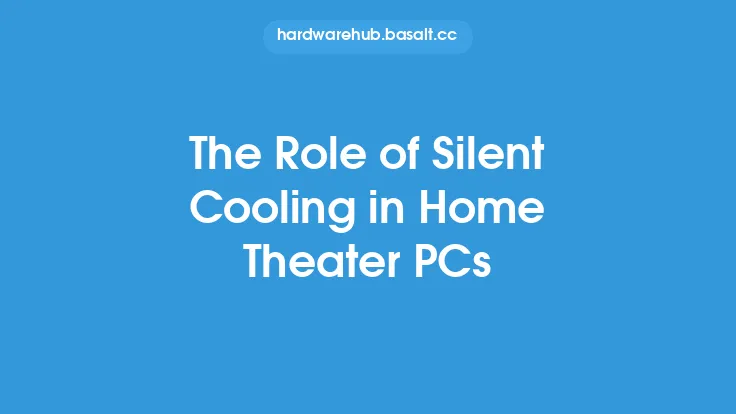When it comes to gaming PCs, one of the most critical aspects to consider is cooling. Gaming PCs generate a significant amount of heat, which can lead to reduced performance, damage to components, and even complete system failure. While traditional cooling methods, such as air cooling and liquid cooling, can be effective, they often come with a significant drawback: noise. This is where silent cooling solutions come into play. But is silent cooling really necessary for gaming PCs?
What is Silent Cooling?
Silent cooling refers to the use of cooling systems that minimize or eliminate noise. This can be achieved through various methods, including the use of specialized fans, heat sinks, and liquid cooling systems designed to reduce noise levels. Silent cooling solutions are often used in applications where noise needs to be kept to a minimum, such as in home theaters, recording studios, and other environments where quiet operation is essential.
The Importance of Cooling in Gaming PCs
Gaming PCs require effective cooling to maintain optimal performance. Modern CPUs and GPUs generate a significant amount of heat, which can cause thermal throttling, reducing the system's performance and potentially leading to damage. In addition, excessive heat can also reduce the lifespan of components, leading to premature failure. Effective cooling is essential to prevent these issues and ensure that the system runs smoothly and efficiently.
Noise Levels in Traditional Cooling Systems
Traditional cooling systems, such as air cooling and liquid cooling, can generate significant amounts of noise. This is often due to the use of fans, which can produce noise levels ranging from 20 to 50 decibels or more. While this may not be a significant issue for some users, it can be a major problem for others, particularly those who use their gaming PCs in quiet environments or for applications where noise needs to be minimized.
Benefits of Silent Cooling for Gaming PCs
Silent cooling solutions offer several benefits for gaming PCs. Firstly, they provide a quiet operating environment, which is essential for users who value a peaceful gaming experience. Secondly, silent cooling solutions can help to reduce noise-related stress and fatigue, allowing users to focus on their gaming sessions without distractions. Finally, silent cooling solutions can also help to improve the overall gaming experience by reducing the noise levels associated with traditional cooling systems.
Types of Silent Cooling Solutions
There are several types of silent cooling solutions available for gaming PCs. These include:
- Fanless cooling systems, which use heat sinks and other passive cooling methods to dissipate heat.
- Liquid cooling systems, which use a liquid coolant to absorb heat and transfer it to a radiator, where it is dissipated.
- Hybrid cooling systems, which combine fanless and liquid cooling methods to provide optimal cooling performance.
- Custom cooling solutions, which are designed to meet the specific cooling needs of a particular system.
Technical Considerations
When it comes to silent cooling solutions, there are several technical considerations to keep in mind. Firstly, the cooling system must be able to effectively dissipate heat, while minimizing noise levels. This requires careful selection of components, such as fans, heat sinks, and radiators, as well as careful system design. Secondly, the cooling system must be compatible with the system's components, including the CPU, GPU, and motherboard. Finally, the cooling system must be designed to provide optimal airflow and heat transfer, while minimizing noise levels.
Challenges and Limitations
While silent cooling solutions offer several benefits, there are also several challenges and limitations to consider. Firstly, silent cooling solutions can be more expensive than traditional cooling systems, particularly for high-performance systems. Secondly, silent cooling solutions may require more complex system design and installation, which can be a challenge for users who are not familiar with cooling systems. Finally, silent cooling solutions may not be suitable for all types of systems, particularly those that require high levels of cooling performance.
Conclusion
In conclusion, silent cooling is a critical aspect of gaming PC design, particularly for users who value a quiet operating environment. While traditional cooling methods can be effective, they often come with significant noise levels, which can be a major problem for some users. Silent cooling solutions, on the other hand, offer a range of benefits, including quiet operation, reduced noise-related stress, and improved gaming performance. By understanding the importance of cooling in gaming PCs, the benefits of silent cooling, and the technical considerations involved, users can make informed decisions about their cooling needs and select the best silent cooling solution for their system.





